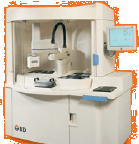BD’s first diagnostic tools date back to basic fever thermometers marketed in its formative years. Decades later, two acquisitions propelled the Company into a leadership position in a far more dynamic market for diagnostic tools and technology. In 1955, BD acquired Baltimore Biological Laboratories (BBL) and began building on BBL’s heritage by expanding into a wide range of media for microbiology laboratories. In 1979, the Company acquired Johnston Laboratories and its expertise in automated blood culturing systems.
Staking out a position in diagnostic equipment proved a timely decision, as the market in the late 1970s was characterized by growing demand for instruments that automated diagnostic processes once done laboriously by hand. The BACTEC line of blood culturing instruments and reagents brought higher levels of efficiency and safety to the clinical analysis of blood-borne infections. In hospital laboratories, BACTEC machines reduced both the staff hours required for blood analysis and the time required to return diagnostic information to the clinician. Today, BD markets the BACTEC 9000 family of continuous monitoring blood culturing instruments for superior safety, reliability, ease of use and media quality.
In 1990, a major breakthrough occurred when BD developed its proprietary amplification technology, Strand Displacement Amplification (SDA). Together with the Company’s portfolio of 180 patents in molecular diagnostics, this technology formed the basis for today’s leadership position in amplified testing for sexually transmitted diseases (STDs).
BD commercialized its SDA technology through the BD ProbeTec system, the current version of which is the BD ProbeTec ET system for the detection of two widespread STDs, Chlamydia trachomatis and Neisseria gonorrhoeae.
Now, BD has introduced the BD Viper sample processor for use with the BD ProbeTec ET system. The BD Viper processor is a significant workflow advancement as it automates the sample handling associated with high-volume testing. Adding the BD Viper processor to the BD ProbeTec ET system results in greater efficiencies at the most labor-intensive steps for ampli-fied systems–sample handling and amplification/detection.
BD’s approach is differentiated by the fact that the BD Viper sample processor is a customized version of an industrial-grade robot that has delivered proven performance in industries as varied as semiconductors and automobiles. The result is a rugged, reliable tool for high-volume clinical laboratories that produce millions of test results a year. While STD testing is BD’s highest-volume molecular test, additional assays are under development that will continue to expand BD’s offering in the molecular diagnostics field.
|
The BD Viper sample
processor improves
laboratory efficiency
by reducing labor,
while ensuring highthroughput
accuracy. |
 |
|



